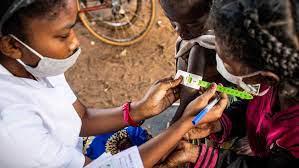
More than 3.8 million people in Niger are being hit by a severe humanitarian crisis, including 2.1 million children. A combination of factors such as conflict, displacement, food insecurity, malnutrition, recurrent disease epidemics and outbreaks, climate-related disasters and the socioeconomic impacts of Covid-19 have led to the emergency in the land-locked West African nation.
The United Nations children’s fund, UNICEF, raised the alarm on Friday saying the people affected show a 30 per cent increase over 2020. It called for increased attention and mobilization to the plight of those children and families who, it said, "suffer in silence”.
"Considering the dramatic increase in the number of people affected by the multiple, prolonged and complex emergencies in the country, it is a challenge to the government and to the humanitarian community to meet their needs", said UNICEF Regional Director for West and Central Africa, Marie-Pierre Poirier.
Conflict, displacement
Insecurity is spreading at a rapid pace in Niger. Attacks along the borders with Burkina Faso, Mali and Nigeria have led to significant displacements in the country and continue to wreak havoc on the lives of hundreds of thousands of children.
"Children’s lives have been torn apart. It is hard to believe that children should live in permanent fear of such attacks. This doesn’t have to be their reality" Poirier warned. "The protection of children’s rights, including children in displacement, is fundamental, be it the right to food, health, education, water or the right to be protected from violence. They need shelter, food, drinking water, medical care and education," she said.
Attacks in the Lake Chad region have prevented nearly 269,000 people in Diffa (eastern Niger) from returning home. More than 195,000 people are now displaced in the regions of Tillabery and Tahoua, in western Niger. Over 77,000 people who have fled inter-communal violence in northern Nigeria are currently living in Maradi region (central Niger), together with more than 21,000 Internally Displaced Persons (IDPs). As of end of March 2021, Niger hosted a total of 313,000 IDPs, 235,000 refugees and 36,000 returnees.
School closures
The number of schools forced to close due to insecurity in conflict-affected areas has increased from 312 to 377 over recent months in Niger. Threats to school security were particularly acute in the regions of Tillabéry, Tahoua and Diffa. In 2020, over 300 schools were closed across the country, affecting almost 22,000 children. Access to schools in these regions is restricted, hampering efforts to support children affected by armed violence.
In a separate statement, Aboubacry Tall, UNICEF Representative in Niger noted that as of the end of May 2021, 409 schools remained closed during the school year. “One should note that more than 2.5 million children of school age are out of school and that 90 per cent of grade 1 students do not complete high school,” he said, adding, “the education sector is in crisis”.
Poirier pointed out that attacks on schools and threats to education are destroying the hopes and dreams of an entire generation of children. “The life of a child excluded from school is a tragedy of unfulfilled potential and lost opportunity", said Poirier who provides leadership for 24 country offices across the region.
Disease
Tall pointed out that over the past decade, Niger has faced the resurgence of several epidemics of diseases preventable by vaccination and/or hygiene and sanitation measures. “In 2020, four epidemics raged in several regions: measles, meningitis, polio, and a very high seasonal peak of malaria,” he said. Last year, there were more than 3million cases of malaria, which is three times higher than in 2019.
Climate
Tall also pointed to the country’s vulnerability to the effects of climate change. “In 2020, record-level flooding hit Niger and affected more than 640,000 people, hugely surpassing previous years and forecasts.” He said climate-related threats have negatively impacted access to services such as health, safe drinking water and education.
Limited humanitarian access
The sharp increase in insecurity and movement restrictions consequently imposed by the Government have hampered humanitarian actors’ access to populations affected by conflict. Tall noted that many of the 2.1 million children, who represent 18 per cent of the country’s children, “are in hard-to-reach areas with limited humanitarian access”. He said that “more than 1.6 million children under five are estimated to suffer from malnutrition, of which over 450,000 are severely malnourished”. Tall described Niger as “one of the most complex and challenging humanitarian environments on our planet”.
Appeal
UNICEF thus called on all stakeholders to respect humanitarian spaces allowing safe and sustainable access to deliver humanitarian assistance to affected populations, including women and children, wherever they are. In 2021, UNICEF and its partners will need $102.2 million to deliver vital humanitarian aid to children throughout the country.
“UNICEF appeals for solidarity to help the Government and its partners provide vital assistance to affected populations and improve their living conditions,” Poirier said.
Source: Vatican News
 FR
FR EN
EN AR
AR








